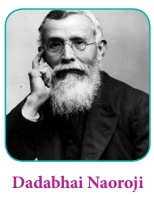Rise of Nationalism in India | History - Naoroji and his Drain Theory | 12th History : Chapter 1 : Rise of Nationalism in India
Chapter: 12th History : Chapter 1 : Rise of Nationalism in India
Naoroji and his Drain Theory
Naoroji and his Drain Theory
Dadabhai Naoroji, known as the ‘Grand Old Man of
Indian Nationalism’, was a prominent early nationalist. He was elected to the
Bombay Municipal Corporation and Town Council during the 1870s. Elected to the
British Parliament in 1892, he founded the India Society (1865) and the East
India Association (1866) in London. He was elected thrice as the President of
the INC.
His major
contribution to the Indian nationalist movement was his book Poverty and Un-British Rule of the British
in India (1901). In this book, he put forward the concept of ‘drain of
wealth’. He stated that in any country the tax raised would have been spent for
the wellbeing of the people of that country. But in British India, taxes
collected in India were spent for the welfare of England. Naoroji argued that
India had exported an average of 13 million pounds worth of goods to Britain
each year from 1835 to 1872 with no corresponding return. The goods were in
lieu of payments for profits to Company shareholders living in Britain,
guaranteed interest to investors in railways, pensions to retired officials and
generals, interest for the money borrowed from England to meet war expenses for
the British conquest of territories in India as well as outside India. All
these, going in the name of Home Charges, Naoroji asserted, made up a loss of
30 million pounds a year.

Related Topics